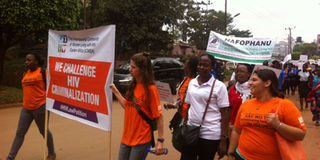Covid-19: NGOs worried as donors go silent on funding

National Forum of People Living with HIV/Aids Networks in Uganda. PHOTO CREDIT | NAFOPHANU WEBSITE
Administrators of Non-Government Organisations operating in Uganda are worried about the sustainability and continued operation because most of their funders have not committed on the next plans.
Many leaders of NGOs told Daily Monitor that they had not received communication from their partners and funders in regard to funding and are not sure how their work will continue during and after the Covid-19 pandemic.
Failure to secure assurances from their donors has since compelled some of the NGOs to scale down on their activities, divert funds to ‘vital’ areas such as payment of workers while others are calling out for government support.
“We are worried that if government does not channel more finance into HIV/Aids programmes, we may have more people die due to failure to get their medicine [ARVs]. This is because most of the funding comes from the US and other European countries which are also heavily affected by this pandemic,” Dr Stephen Watiti, the chairperson of the National Forum of People Living with HIV/Aids Networks in Uganda (NAFOPHANU), said yesterday.
He urged government to devote more financing into purchase of ARVS and other HIV/Aids related activities that are largely funded by the foreign donors.
Mr Xavier Ejoyi, the executive director of ActionAid Uganda, said his organisation has had to engage their funders to allow them reschedule some of the activities and divert funds to other areas contrary to original plans.
“We had a conversation with our donors and agreed to reschedule some of the activities. For instance, those activities that were meant for April were pushed to September,” Mr Ejoyi said.
“We have had to also invest more energies in responding to gender-based violence since they are on the rise. We have had more money going to that specific intervention,” he added.
Ms Sylvia Namubiru, the executive director of Legal Aid Service Providers Network (LASPNET), said she is uncertain of what they will do when the funding is finished.
“Donors give us funding on a quarterly basis. They made an effort to get us what can run us for the next two quarters. After this Covid-19, we do not know whether the donors will change their approach,” Ms Namubiru said.
She, however, reiterated her call on government to develop a scheme that will finance the activities they provide, especially to the poor and vulnerable persons.
LASPNET provides legal support in form of Pro bono services (free legal services), mobilises legal aid and services and also convenes dialogues devoted towards bettering legal service delivery in the country.
“We have been advocating for government to give us a state-funded scheme and now that it has delayed, we don’t know what will happen. We are going to wait and see what donors say to that effect,” Ms Namubiru said.
When asked about what they will do in case donors cut funding, she said: “The plan will definitely be to go indigenous and call on government to give funds and support.”
Ms Apio Claude, the executive director of the NGO Forum in Lira District, said none of the donors had communicated on whether they would stop or continue the funding.
“There is still no communication on the state of affairs but I hope they [donors] will communicate soon,” Ms Apio said.
She also said some donors had not yet released money for development initiatives in northern Uganda.
“I get funding from EU [European Union] under DINU [Development Initiatives for Northern Uganda] but EU has not yet sent. So we can’t convene for most of the planned activities. They had given us some money for scaling up our activities but I am not going to scale them up because the money is not enough. I will instead do what my capacity can handle,” Ms Apio said.
“So much of the work we are now doing is paperwork like drawing up planning tools, procurement plans and others,” she added.
Mr Richard Ssewakiryanga, the executive director of Uganda National NGO Forum, said most NGOs are engaging their partners on how to develop contingency plans to withstand the effects of the pandemic.
“Everybody knows this is a global pandemic and it is affecting people everywhere. One of the things that our partners have agreed to do is to stay in solidarity with their organisations and think on how to get through this,” Mr Ssewakiryanga said.
“Many organisations have had conversations with their partners on how to develop contingency plans on how to get through this period [pandemic],” he added.
Strategies
Measures. Mr Richard Ssewakiryanga, the executive director of Uganda National NGO Forum, said most NGOs are engaging their partners on how to develop contingency plans to withstand the effects of the pandemic.
“Many organisations have had conversations with their partners on how to develop contingency plans on how to get through this period [pandemic],” he added.



